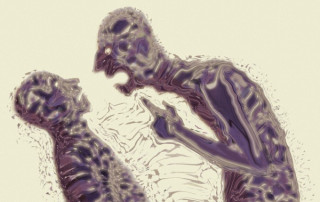Fight, Flight and … Freeze? Most people have heard of the “fight or flight” response. It is the body’s naturally hard-wired way of dealing with threats to one’s safety. I have written about it before, a few times, so I won’t go into it again but today I’m going to mention the third part of this response: freeze. In nature, animals typically go to flight first, since they are free of ego and have nothing to prove, only to enhance their own chances of survival. If they can’t go to flight and escape danger, they will go to fight, posturing and growling in hopes of scaring off the threat. If this fails, they will actually engage in aggressive behavior, albeit defensive aggression. Once these two options are unsuccessful, or if they are unavailable, most species have a form of reflexive behavior that could be termed “playing dead”. Playing Dead Emotionally Since most of the threats people face in our neck of the woods are social or emotional (although many do face actual physical threats in many forms), the freeze response may look a bit different than it does for a possum or cat. In our case, we tend to play […]
All Aggression is Defensive
Making a Case for a Single Motivation of Aggressive Behavior Lots of research in recent years has distinguished between two types of aggressive behavior: reactive aggression and proactive (or instrumental). So what distinguishes one from the other? Simply stated, reactive aggression is a response to something, whereas proactive aggression is not. It is also referred to as instrumental aggression because it can be seen as a means to a particular end. This distinction seems to make intuitive sense and the research seems to reinforce intuition in this instance. However, despite the surface differences between these forms of aggression, is it possible that something is missing? Is it possible that all aggression is reactive, or defensive, in nature? Consider the neurobiological home of aggression, the fight-or-fight (FoF) response of the nervous system. Aggression does not exist without arousal of the FoF system. Therefore, it stands to reason that even proactive aggression is caused by the brain’s perception of a threat that may warrant activation of the FoF system. After all, it is the FoF response. In order for a response to be elicited, there must be a stimulus that is being responded to. It is by this logic that it may […]





Recent Comments